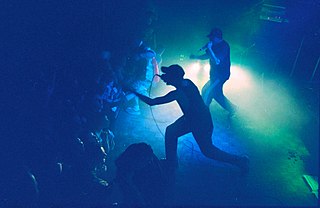
The Osdorp Posse, founded in Amsterdam, Netherlands, in 1989, was one of the first groups to make rap music in Dutch. All four members are related to each other. Influenced by gangsta rap, they made a name for themselves by combining the music of hardcore hip hop with Dutch lyrics featuring literal translations of American slang. Initially appreciated only in the Dutch underground scene, they achieved commercial success and exerted great influence on the Dutch hip hop scene.
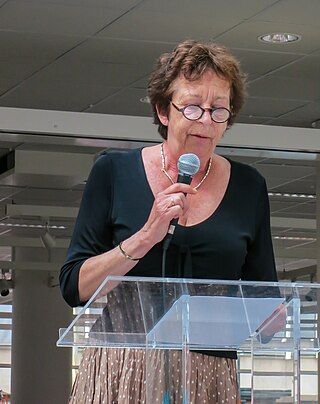
Renate Maria Dorrestein was a Dutch writer, journalist and feminist. She started working as a junior journalist for the Dutch magazines Libelle and Panorama. During the period 1977 - 1982 she published in Het Parool, Viva, Onkruid and Opzij. Dorrestein published her first novel (Buitenstaanders) in 1983. Her sister's suicide had a great influence on her books. Dorrestein won the Annie Romein prize in 1993 for her complete body of work. A lot of Dorrestein's books were translated, and they were sold in 14 countries.
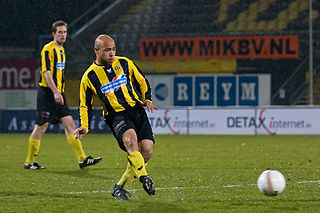
Ryangelo "Angelo" Cijntje is a Curaçaoan former professional footballer, who played most of his career as a right back for BV Veendam.

Gorki was a Belgian rock group, in its most recent line-up consisting of Luc De Vos, Luc Heyvaerts, Erik Van Biesen, Thomas Vanelslander (guitarist) and Bert Huysentruyt (drums). Three songs by Gorki were number one hits in the Studio Brussel alternative hitlist De Afrekening in Belgium: 'Lieve kleine piranha', 'Schaduw in de schemering and 'Joerie' in 2006. Luc De Vos died on 29 November 2014.

Kinderen voor Kinderen is a Dutch children's choir maintained by public broadcaster BNNVARA.

Ronald Edwin Tober is a Dutch singer, known for representing the Netherlands in the Eurovision Song Contest 1968 with the song "Morgen".
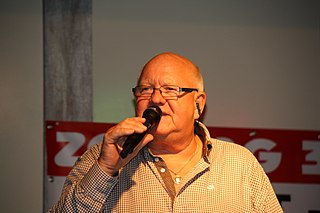
Henk Wijngaard is a Dutch country singer.

Liliane Saint-Pierre is a Belgian pop singer. Hailing from Flanders, she sings mostly in Dutch. She competed at Eurovision Song Contest 1987 with the song "Soldiers of Love".
"Ik heb een potje met vet" is a traditional song in the Dutch language. It was traditionally sung by soldiers, popularised in 1974 by the Dutch band Hydra with three verses added to the chorus, and now is very popular for singing during long walks and bus journeys. The song is also popular amongst lesbians because potje is the diminutive of the pot, originally a swearword for lesbians, but successfully reappropriated as a word for proud self-identification. It can be seen as the Dutch version of the similar English song "99 Bottles of Beer".

Afrikaans is a daughter language of Dutch mainly spoken in South Africa and Namibia; it is a separate standard language rather than a national variety, unlike Netherlands Dutch, Belgian Dutch and Surinamese Dutch. An estimated 90 to 95% of Afrikaans vocabulary is ultimately of Dutch origin, so there are few lexical differences between the two languages, however Afrikaans has considerably more regular morphology, grammar, and spelling.
The subjunctive in Dutch is a verb mood typically used in dependent clauses to express a wish, command, emotion, possibility, uncertainty, doubt, judgment, opinion, necessity, or action that has not yet occurred.

Bart Kaëll is the stage name of Bart Marcel Emilienne Gyselinck, a Flemish singer and TV host.

Jeannette van Zutphen was a Dutch singer.
Halo, Halo Bandung is an Indonesian patriotic song written by Ismail Marzuki that describes the spirit of the struggle of the people of the city of Bandung in the post-independence period in 1946, particularly in the Bandung Sea of Fire that occurred on March 23, 1946.
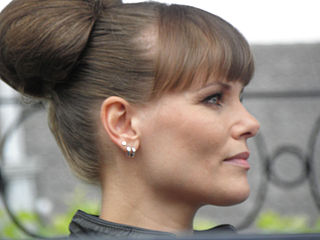
Angela Schijf is a Dutch actress. On 3 July 2002 she married the Belgian actor Tom Van Landuyt; together, they have 3 daughters. She is best known for playing Eva van Dongen in the Dutch TV-series Flikken Maastricht. She also performs the show Kreutzersonate als het verlangen maar stopt in theatres around the Netherlands and Belgium with her husband and 2 musicians.

Omroep Zeeland is a public broadcaster located in Zeeland, Netherlands. Founded in 1988, the media organization is active in television, radio, and internet. The audience is on average slightly older than that of the other Dutch regional broadcasters.
In the Netherlands, the Vlag en Wimpel award is an honourable mention awarded by either the jury of the Gouden Griffel and Zilveren Griffel awards or the jury of the Gouden Penseel and Zilveren Penseel awards. The award is organised by the Collectieve Propaganda van het Nederlandse Boek. Starting in 2022, instead of Flags and Pennants, Bronze Griffels and Bronze Brushes will be awarded. The name change is intended to underscore the purpose of these awards: to highlight the best children's books.
Ecotribe Teuge is a collective of people living on a squatted terrain in the Dutch countryside. It is located on the edge of the village of Teuge, in the province of Gelderland. The buildings were constructed by the Nazis and formerly used to house Moluccan soldiers. The site was occupied in 2001, when people began to live there in an off-the-grid and self-sufficient manner. Since 2018, there are plans by the province to develop the terrain.
Maud Hawinkels is a Dutch television presenter.













